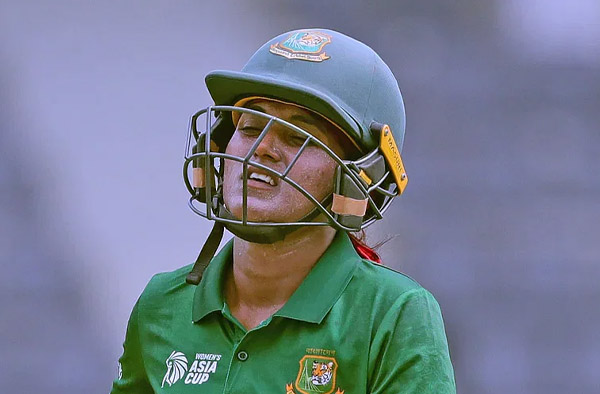The ninth edition of the Women’s Asia Cup, held from July 19 to July 28, 2024, in Sri Lanka, ended in disappointment for Bangladesh. Despite a commendable group stage performance, the Tigresses’ campaign concluded with a crushing 10-wicket defeat to India in the semi-final. This heavy loss has raised serious concerns about their prospects in the upcoming ICC Women’s T20 World Cup.

Bangladesh’s journey in the tournament began on a sour note with a seven-wicket defeat to the host nation, Sri Lanka. However, the team managed to secure victories against Thailand and Malaysia, finishing second in Group B with 4 points and a spot in the semi-final. Murshida Khatun stood out with 130 runs, while Nahida Akter and Rabeya Khan each took 5 wickets during the group stage.
The semi-final clash against India, however, exposed significant gaps in Bangladesh’s performance. Losing by 10 wickets, the Tigresses struggled across all departments, leading to a defeat that highlighted the difference in quality between the two sides. This performance comes on the back of a challenging year for Bangladesh, marked by a series of defeats to Australia and India on home soil, as well as struggles in domestic competitions.
The upcoming ICC Women’s T20 World Cup, set to begin on October 3, 2024, will see Bangladesh competing against formidable opponents like England, the West Indies, and South Africa. The current state of the team and their recent performances suggest a difficult road ahead.
Nazmul Abedeen Fahim, who previously mentored the women’s team during their successful 2018 Asia Cup campaign, voiced his concerns about the team’s future. Fahim expressed doubt over the team’s ability to handle potential further humiliations, noting the significant strides made by other teams while Bangladesh has seemingly regressed.
Fahim criticized the quality of domestic women’s cricket in Bangladesh, describing it as insufficient for producing players capable of competing at the international level. He also pointed out that the team management has been in place for an extended period without delivering improved results, raising questions about their effectiveness.
“There is every possibility of bigger humiliations in the upcoming World Cup,” Fahim told The Daily Star. “It wouldn’t be surprising if we don’t do well. There will be more criticism, and I don’t think the players would be able to handle that.”
He highlighted a troubling trend of regression, contrasting Bangladesh’s past competitive edge with the current situation. “There was a time when we gave tough fights to India, and Pakistan and Sri Lanka were on a similar level as us. Now, those teams have advanced while we seem to be moving backward,” Fahim stressed upon.
The future of Bangladesh’s women’s cricket hangs in the balance as the team prepares for the World Cup. The need for significant improvements and strategic changes is evident if the Tigresses are to regain their competitive edge and achieve better results on the global stage.